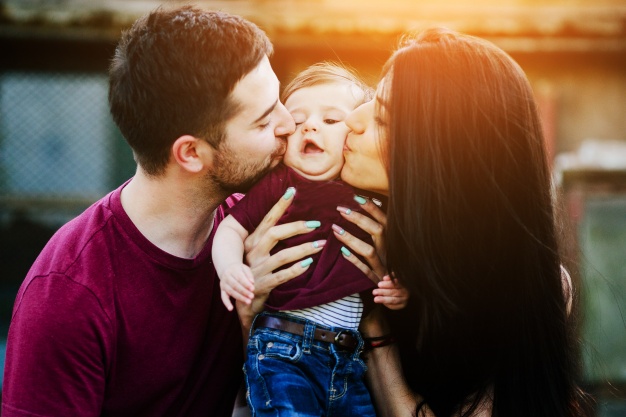Children Need Mom and Dad - Wk #3
Oh, how a child needs both their mother and their father. Not only does research help indicate this, but something in our heart may as well. For myself, I know I learned such different things from both my mom and my dad. My dad was never the nurturer that my mother was, and my mother could've never, through her example alone, shown me what I ought to look for (and look out for) in men, and ultimately my husband.
My father taught me that sometimes, even when it's hot and miserable outside, chores still need to be done. My mother taught me that doing a job correctly the first time will always be more satisfying than doing it lazily first, and then correcting it over.
My mother nurtured in a way I cannot explain, but perhaps psychoanalyst, parent coach and author Erica Komisar can explain the mother-child bond a little better as she advocates for the need for mother-child relationships. Komisar is the author of the book Being There: Why Prioritizing Motherhood in the First Three Years Matters.
Through psychology and research, Komisar believes that, "mothers are biologically necessary for babies... mothers are the central nervous system to babies".
Oxytocin, or the "love hormone" as it is often referred to, plays a large role in social bonding and relationships, sexual activity, childbirth and breastfeeding. Oxytocin is more prevalent in women than men on average (Medical News Today) and according to Komisar and her research, is why babies need their mothers so much. “ '[Oxytocin] is a buffer against stress... The more oxytocin the mother produces, the more she produces it in the baby” (Komisar), by communicating via eye contact, touch and gentle talk. The baby’s brain in turn develops oxytocin receptors, which allow for self-regulation at a later age (Wall Street Journal).
How amazing that women are natural nurturers and that babies not only need mothers while in utero, but also significantly need them after birth as well, for both boys and girls.
My mother had five sons, and her impact on them has changed their lives forever. What I found to be particularly interesting though was from the University of Reading, Dr. Pasco Fearon from the School of Psychology and Clinical Language Sciences, studied the development of children and their relationships with their parents, "Our analysis showed that children with insecure attachments to their mothers, particularly boys, had significantly more behavioural problems, even when the behavioural problems were measured years later" (2010).
While I could post several blogs full of the reasons and research on why mothers have such an incredible impact on their children, I want to shift slightly into the role fathers play in their children's development as well.
Linda Nielsen, a professor of adolescent and educational psychology at Wake Forest University (North Carolina), has a special interest on father-daughter relationships. In her article that she wrote for the organization: the Institute for Family Studies, she talks about the various ways that fathers influence their daughters. From seeking a higher education, to being less likely to get pregnant as a teenager. These girls with loving, supportive fathers, are also more likely to have relationships with men that are more fulfilling and emotionally intimate. And surprisingly, fathers generally impact their daughters' relationships with men more than mothers do.
In the book All the Light We Cannot See, by Anthony Doerr. Marie-Laure LeBlanc and her father live in Paris, France. The year is 1934, and Marie-Laure is a blind 6-year old, whose father is trying to teach her important skills in finding her way blindly through life. I love the example of warmth and love Mr. LeBlanc shows his daughter. She always knows she can trust him. I love the quote, "“He sweeps her hair back from her ears; he swings her above his head. He says she is his émerveillement [wonderment or delight]. He says he will never leave her, not in a million years.” The father-daughter relationship portrayed in this book is beautiful, and a wonderful example of what fathers can be for their daughters.
Oh how children need the natural gifts of both a mother and father. How dearly they need a stable environment to help them grow strong in this beautiful yet, tumultuous world. How wonderfully mothers and fathers can help each other in their unique and wonderful roles.
I do advocate for the traditional family. I defend it as the only institution on earth that can provide the love, and stability that children need in order to grow into the healthy, and stable adults this world needs.
Mothers and fathers love your children. Guide them. Defend them. Teach them. Be advocates for your family. Be a source of influence as well for other children and adolescents you may know who need your help in their confused world of heartache and brokenness. Talk about the importance of mothers and fathers' roles in your own circles and communities. May we all learn a little bit from each other in this quest to be the people our children need.
REFERENCES
Oxytocin - https://www.medicalnewstoday.com/articles/275795.php#what_is_oxytocin
Erica Komisar - http://www.komisar.com/
The Politization of Motherhood, Wall Street Journal, Taranto, 2017
University of Reading, Mother-son relationship key to emotional development, 2010
Institute for Family Studies, How Dads Affect Their Daughters Into Adulthood, Nielsen, 2014
Balcom, D. A. (1998). Absent fathers: Effects on abandoned sons. The journal of men’s studies, 6(3), 283-296.
All the Light We Cannot See, Anthony Doerr, 2014





Comments
Post a Comment